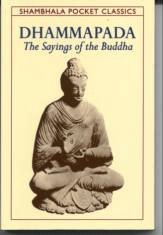
Choices
We are what we think.
All that we are arises with our thoughts.
With our thoughts we make the world.
Speak or act with an impure mind
And trouble will follow you
As the wheel follows the ox that draws the cart.
These are the first verses of the Dhammapada, The Sayings of the Buddha. In the foreword of this version, Baba Ram Dass advises us that the words come to us in purity and divine simplicity, and must be received with the same. He tells us "that which feeds only the intellect entraps, while that which feeds the soul liberates," and that the Buddha's words come from the soul, and must be heard by the soul.
That is simply not my way.
I am trained in close reading, as are most of us who pursue the liberal arts. Whenever I read an ancient text, I am constantly comparing the different translations, seeking the nuances of word choice, and investigating the translator's motives. I have been taught to believe that there is no such thing as a "direct" translation, and every scholar or translator has an agenda. The suggestion of Ram Dass seems quaint, naive even - how can I put aside discernment and just let the words enter as they will? I am lost without my intellectual tools.
This version of the Dhammapada came out in 1976, and I have been reading it off and on since about 1986. In those years I have occasionally had a flash of understanding in which a few verses suddenly come rushing to mind and make perfect sense for a few moments, or rarely, a few days. Regardless of my efforts to hang onto these snatches of clarity, with time they always fade, sinking again below the waves in my mind. I am compelled now to accept that I am a slow learner - not only because I still can only dimly grasp the meaning of the text, but also because it has taken me about twenty years to realize that I must be doing something wrong...
It is a choice to read a text in simplicity. By the same token, it is a choice to refuse to let go of your intellect. It's an anchor to some of us, especially we academic types. It is the hard point that secures us in this world and helps us stay upright. Of course, the Buddha never promised you that you'd stay upright - just that you'd see clearly.
So, heres to a simple reading of the Dhammapada, and may the English Major in me sit this one out...
Simple
Subscribe to:
Post Comments (Atom)




4 comments:
why can't we translate the names of the books to simpler things? I still call your philosophical series of posts "long jogs". And this book to me will be the "Damn panda"
Clay, being dumb, for enlightenment.
Actually, I was going to include the meaning of the book's title, but the post was a bit long already for a Thursday morning.
Dhamma (sometimes rendred as "dharma") means "the law" or "the teaching. Pada means "the path" or "the way." It is sometimes translated as "the just path" or "the way of the Buddha's teachings."
Not really helping, am I?
I found it helpful.
oddly if you were to say 仏道 【ぶつどう】, I would get it right way.
but that hardly helps anyone else.
Post a Comment